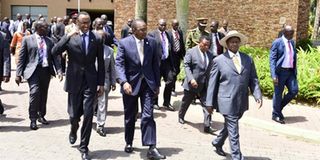Uganda chooses Tanga route for oil pipeline

Presidents Paul Kagame (Rwanda) Uhuru Kenyata (Kenya) Yoweri Museveni (Uganda) attending the 13th Northern Corridor heads of state summit in Kampala, Uganda. PPU PHOTO
KAMPALA: It is a done deal. Uganda has officially chosen the Southern route through Tanzania for the proposed crude oil export pipeline.
The much awaited decision on the $4b project was announced Saturday (April 23) at the 13th Northern Corridor Infrastructure Summit in Munyonyo attended by President Yoweri Museveni, Kenyan President Uhuru Kenyatta and Rwanda’s Paul Kagame.
Also in attendance were Tanzania’s minister of Foreign Affairs Dr Augustine Mahiga, the South Sudanese presidential advisor on Economic Affairs Aggrey Sabuni, and Ethiopia’s deputy premier Debretsion Gebremichael.
Speaking at the summit, President Museveni, said: “I have agreed with President Kenyatta that, let the two pipelines go ahead, one from Lokichar to Lamu and another from Hoima to Tanga,”
The announcement ends months of speculation and protracted deliberations by technocrats from the governments of the three east African countries; Uganda, Kenya and Tanzania.
Initially, the three countries were torn between the Northern route to the Kenyan Lamu archipelago at the Indian Ocean, and Southern route from Hoima to Tanga port also at the Indian Ocean.
At today’s summit, however, the heads of state agreed that Kenya will develop its own oil pipeline from Lokichar, where the country discovered oil, currently estimated at 600 million barrels to Lamu.
The Japanese engineering firm Toyota Tsusho in 2014 conducted and submitted feasibility study on the Lamu and Mombasa routes, but recommended the 1,300km (808 mile) Lamu route citing the need to tap into the economies of scale of LAPSETT corridor—a joint infrastructure project of South Sudan, Ethiopia and Kenya.
The 1,403kilometer (876-miles) southern route is backed by French oil giant Total SA– one of the three oil firms licenced to operate in Uganda together with UK’s Tullow Oil PLC and China’s Cnooc. Total which has conducted a study on this route says is willing to bankroll the project.
The decision on the pipeline also came on the heels of a meeting held Friday night at State House-Entebbe between President Museveni and a delegation from the French oil giant led by the Africa director for exploration and production, Guy Maurice and Total E&P-Uganda general manager Adrewale Fayemi.
At the summit, the heads of state also underscored the importance of ICT in promoting regional interconnectivity, and welcomed the development of a framework for regional data roaming within a maximum retail tariff of $11 cents per megabyte and a maximum inter-operator tariff of $7 cents per megabyte.
The leaders directed ICT ministers of the three countries to operationalise the framework, including procurement of a traffic monitoring systems for detection of fraudulent calls (grey traffic).




